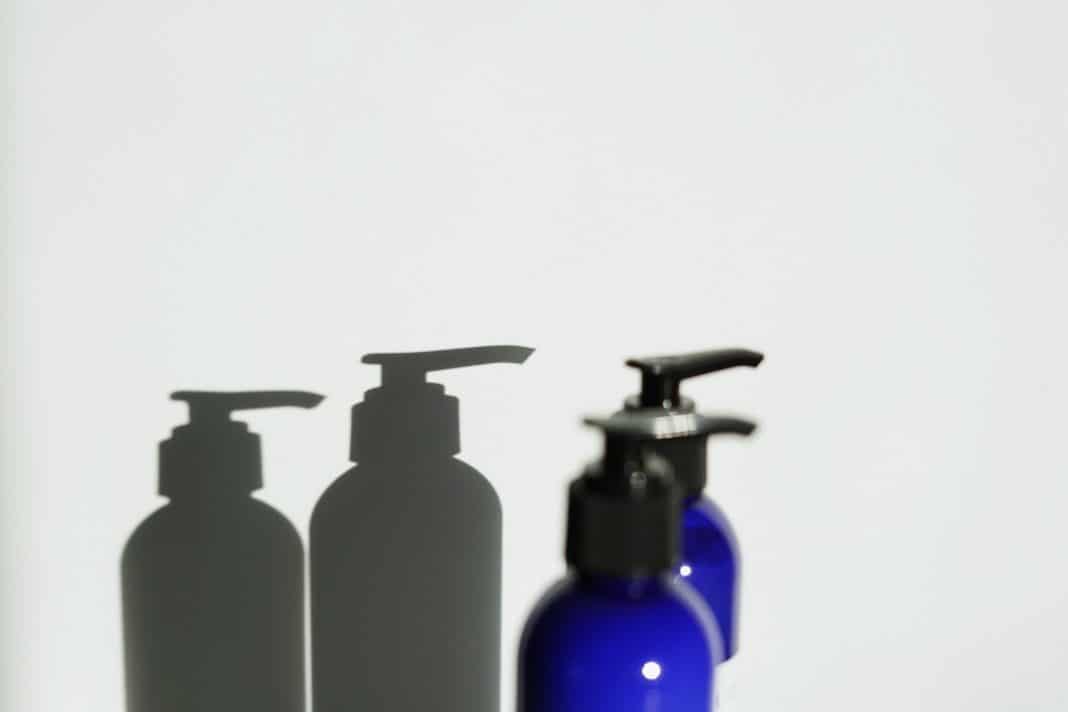They say that blondes have more fun, but if blonde isn’t your natural color, you might be in for a lot of work to keep it up. Truth is, maintaining golden locks isn’t easy. Repeatedly coloring or bleaching your hair can be damaging, causing it to become dry, brittle, or porous. Additionally, some environmental factors can influence the health of your hair, such as having hard water in your home. Many women with hair that has been dyed blonde deal with brassy tones or fading of the original color over time. In an effort to make life as a blonde a bit simpler, there a many speciality products on the market. And this is how purple shampoo became a popular trend in the beauty industry.
Purple shampoo is exactly what it sounds like. It’s a bright purple shampoo that’s specifically marketed toward women who color their hair blonde. Typically, no matter the brand, these shampoos all claim to do the same thing. They’re intended to balance the colors of blonde hair by working against fading and preventing the emergence of brassy tones. If you’ve found yourself wondering if they work, you should know we’ve found ourselves wondering the exact some thing. We’ve heard of countless beauty products that don’t live up to the hype or can’t deliver on the bold claims they make. Is purple shampoo just one more useless product you don’t need?
Two industry experts gave us the lowdown on purple shampoo and cleared up a few other commonly asked questions about shampoo.
Does purple shampoo actually work?
Using a purple or violet shampoo may seem like a strange grooming practice, but the reason it works is as simple as looking at the color wheel. Purple and yellow are complementary colors, which means that in the right proportions, they effectively cancel each other out. Because of this, the purple or violet color of the shampoo neutralizes the undesirable brassy tones in your hair and helps to return it to a cooler blonde or platinum color.
“Not only do purple shampoos work but they belong in the haircare arsenal for most anyone with blonde, gray, or lightened hair. They’re all about neutralizing brassy tones and, particularly for blondes, help keep hair looking fresh and icy,” explains Fae Norris, licensed cosmetologist and esthetician at Neighborhood Salon in Echo Park, California. Before you splurge on a bottle of purple shampoo, you should know that this isn’t a product everyone needs on hand. According to professional hairstylist and industry educator Michelle Farley, this is a product that is only meant for those with blonde, platinum, gray, or white hair.  “It will not make a difference on hair that is dirty blonde, light brown, or darker. If they get lighter highlights, it will tone the lighter pieces only. It will not correct a bad color job or if the hair is an unwanted orange tone. The orange is too strong to counteract the violet,” she explains. When it comes to buying a purple shampoo, there are a few things you should know. If you’re on a drugstore budget, Norris recommends Clairol’s Shimmer Lights but warns that it can have a drying effect. Although it works well, she recommends following it up with a good conditioner. If you are able to spend a little more, Norris recommends No Yellow by Fanola.
“It will not make a difference on hair that is dirty blonde, light brown, or darker. If they get lighter highlights, it will tone the lighter pieces only. It will not correct a bad color job or if the hair is an unwanted orange tone. The orange is too strong to counteract the violet,” she explains. When it comes to buying a purple shampoo, there are a few things you should know. If you’re on a drugstore budget, Norris recommends Clairol’s Shimmer Lights but warns that it can have a drying effect. Although it works well, she recommends following it up with a good conditioner. If you are able to spend a little more, Norris recommends No Yellow by Fanola.  “It’s significantly stronger and less drying than Shimmer Lights,” she says, cautioning that leaving it on too long could actually result in purple hair. (Although Farley says a wash with clarifying shampoo will solve this problem.) No matter what brand you choose, Norris recommends you don’t shampoo with purple shampoo more than once a week.
“It’s significantly stronger and less drying than Shimmer Lights,” she says, cautioning that leaving it on too long could actually result in purple hair. (Although Farley says a wash with clarifying shampoo will solve this problem.) No matter what brand you choose, Norris recommends you don’t shampoo with purple shampoo more than once a week.
Do I have to spend a lot on my shampoo?
The price difference between drugstore shampoos and name-brand products can be alarming.  It’s hard to know if spending that much is really necessary. Although many will say that drugstore brands are always a bad choice if you want healthy hair, Farley says the ingredients are way more important than the brand name printed on the bottle.
It’s hard to know if spending that much is really necessary. Although many will say that drugstore brands are always a bad choice if you want healthy hair, Farley says the ingredients are way more important than the brand name printed on the bottle.
In general, professional products have higher quality ingredients, which is why they are more expensive.
“These categories range so widely it is hard to say definitively. In general, professional products have higher quality ingredients, which is why they are more expensive. They are less damaging to the hair than cheap ingredients,” she explains, adding that even expensive products have been known to use cheap ingredients and that she knows of plenty of inexpensive products that are gentle on the hair.
Should you really “rinse and repeat”?
For as long as I can remember, the phrase “rinse and repeat” has been in the instructions of every shampoo I have ever bought. Is a second washing really all that necessary? The answer, like many things in the beauty world, is all about your hair type and lifestyle. “It’s not hard to figure out why a shampoo company would have ‘rinse and repeat’ on a bottle but it’s really only necessary if there happens to be a lot of buildup. If hair starts looking dull, feeling extra dirty and greasy, or is laying flatter than usual after just a day or two, then washing twice makes sense,” explains Norris, adding that a clarifying shampoo can accomplish the same result after just one wash. If you don’t shampoo often, rinse and repeat may be the right choice.  According to Norris, if you are only washing once a week with a sulfate-free shampoo, your hair may require a second wash before applying conditioner. This will remove buildup and allow your hair to better absorb your conditioner.
According to Norris, if you are only washing once a week with a sulfate-free shampoo, your hair may require a second wash before applying conditioner. This will remove buildup and allow your hair to better absorb your conditioner.
Can I skip shampoo altogether?
In the world of curly hair, skipping shampoo altogether is a fairly common practice. Instead, women with curly hair are often advised to adopt “co-washing,” or using their conditioner as their cleanser. According to Norris, shampooing less is a good practice, but conditioner can’t replace shampoo for the long term.  “I’m all for skipping shampoo if you have dry, curly hair or if you’ve gone with fashion colors. But that doesn’t mean you should avoid deep cleaning. At least once or twice a week it’s important to do a real scalp scrub, rinse, and condition. Daily brushing should also be part of the regimen as it stimulates the scalp and helps move the oil down to the drier ends,” she says.
“I’m all for skipping shampoo if you have dry, curly hair or if you’ve gone with fashion colors. But that doesn’t mean you should avoid deep cleaning. At least once or twice a week it’s important to do a real scalp scrub, rinse, and condition. Daily brushing should also be part of the regimen as it stimulates the scalp and helps move the oil down to the drier ends,” she says.
Can I shampoo every day?
On the opposite end of the spectrum, there are plenty of people who insist a daily shower and shampoo is the only way they can start the day. But some say that a daily shampoo can be bad for your hair, drying it out and causing it to produce more oil. How much truth is there to this claim?  According to Norris, only certain hair can handle a daily shampoo. Fine, flat, or oily hair can benefit from daily shampoos, especially if it isn’t as voluminous as you might prefer. But daily shampooers should be certain they’re using a high-quality shampoo and following it with hydrating conditioner. If the ends of your hair or your scalp seem to be dry, daily shampooing might not be the best habit. Instead, if a daily shower is your thing, she suggests a rinse followed by a conditioner to refresh your hair.
According to Norris, only certain hair can handle a daily shampoo. Fine, flat, or oily hair can benefit from daily shampoos, especially if it isn’t as voluminous as you might prefer. But daily shampooers should be certain they’re using a high-quality shampoo and following it with hydrating conditioner. If the ends of your hair or your scalp seem to be dry, daily shampooing might not be the best habit. Instead, if a daily shower is your thing, she suggests a rinse followed by a conditioner to refresh your hair.  “The frequency of hair washing is entirely dependent on the individual’s hair type, shampoo, and lifestyle. Some of the factors at play include where someone lives and the harshness of their tap water, if they work out every day and, of course, if hair is bleached, which needs the least amount of washing. If the hair is coarse and frizzy, once a week or even just using conditioner can also be enough,” she says. “For other hair types, simply rinsing and conditioning daily is more gentle and will refresh the hair,” says Norris.
“The frequency of hair washing is entirely dependent on the individual’s hair type, shampoo, and lifestyle. Some of the factors at play include where someone lives and the harshness of their tap water, if they work out every day and, of course, if hair is bleached, which needs the least amount of washing. If the hair is coarse and frizzy, once a week or even just using conditioner can also be enough,” she says. “For other hair types, simply rinsing and conditioning daily is more gentle and will refresh the hair,” says Norris.
Do I need to switch shampoos regularly?
One common piece of shampoo-related advice is that you need to switch up the brand you use on a regular basis. The idea is that your hair grows accustomed to a certain brand and that brand becomes ineffective over time. This is said to cause your hair to lack volume or to become hard to manage. The truth is, if your favorite shampoo doesn’t seem to have the same effect it once had, buildup could actually be to blame.  “Finding the right shampoo can be a lot of trial and error. If you find one that works initially it might stop being as effective down the road. That’s usually caused by buildup. Some shampoos use animal proteins and, just like the way they can build up in our arteries, they can build up on hair. I suggest using a detox shampoo on occasion, particularly if you’ve found a product you really like,” Norris says.
“Finding the right shampoo can be a lot of trial and error. If you find one that works initially it might stop being as effective down the road. That’s usually caused by buildup. Some shampoos use animal proteins and, just like the way they can build up in our arteries, they can build up on hair. I suggest using a detox shampoo on occasion, particularly if you’ve found a product you really like,” Norris says.



